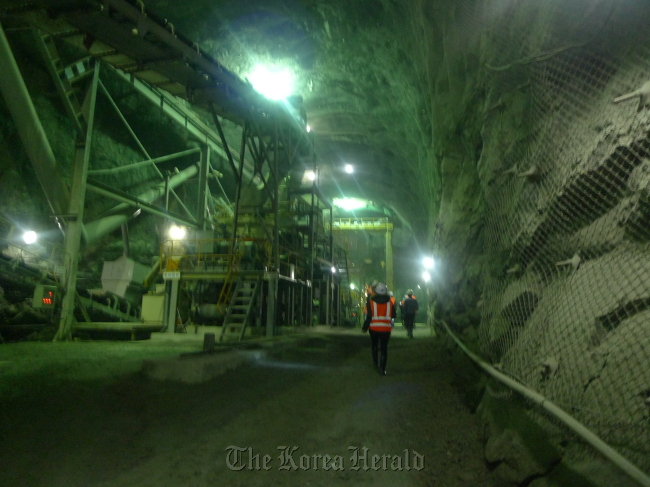Korea supports redevelopment of mines to secure minerals
By Korea HeraldPublished : Nov. 5, 2012 - 20:24
JECHEON ― The Korean government is speeding up the reopening of closed mines that were shut due to lack of profitability, to re-build domestic supply channels for strategic minerals critical for manufacturing.
The initiative to redevelop the mines was launched by the Ministry of Knowledge Economy in 2008. The drive is in line with the ministry’s strategy to increase mineral self-sufficiency. For this, the ministry also has increased investment in mineral development projects overseas.
The ministry has set the goal of opening 22 mines again by 2017 and has introduced varying supporting programs to modernize the mine business to achieve that end.

NMC in Jecheon, North Chungcheong Province, was reborn in 2010 as the only molybdenum mine in operation in Korea, based on the ministry’s mine redevelopment initiative. The molybdenum mine was closed in the late 1980s due to falling profitability. Before the opening of NMC, Korea imported all of its molybdenum, which is used to make steel and machinery products.
“We produce 1,300 tons of molybdenum per year, which meets 6 to 7 percent of domestic demand,” NMC president Han Yoo-sup said, adding that he is expecting the company to achieve 13 billion won ($11.9 million) in sales this year.
While redeveloping the mine, he said the company put a focus on modernization of facilities and equipment not only for mining processes but also for environment protection. The mine company also widened the tunnel to make a motor way.
“Despite the production of NMC, Korea still has to import the majority of molybdenum, but whether to have a domestic supply channel or not is important to build negotiation power in pricing of molybdenum imports,” Han said.
Prices of minerals have fluctuated since the year 2000 as mineral-rich countries such as China use their mineral reserves to facilitate economic growth by reducing export quotas. For instance, China produced 97 percent of the world’s rare earth metals last year, according to the 2011 USGS mineral commodity summaries. Rare earth metals include minerals that are critical to producing innovative goods like hybrid cars and flat-screen TVs.
Korea is one of the world’s biggest mineral importers and the nation’s self-sufficiency rate in minerals lingered at 6.1 percent in 2011.
To support reopened mines to seek sustainable growth, the ministry said it will consider supporting their technology-driven R&D projects.
By Seo Jee-yeon (jyseo@heraldcorp.com)
The initiative to redevelop the mines was launched by the Ministry of Knowledge Economy in 2008. The drive is in line with the ministry’s strategy to increase mineral self-sufficiency. For this, the ministry also has increased investment in mineral development projects overseas.
The ministry has set the goal of opening 22 mines again by 2017 and has introduced varying supporting programs to modernize the mine business to achieve that end.

NMC in Jecheon, North Chungcheong Province, was reborn in 2010 as the only molybdenum mine in operation in Korea, based on the ministry’s mine redevelopment initiative. The molybdenum mine was closed in the late 1980s due to falling profitability. Before the opening of NMC, Korea imported all of its molybdenum, which is used to make steel and machinery products.
“We produce 1,300 tons of molybdenum per year, which meets 6 to 7 percent of domestic demand,” NMC president Han Yoo-sup said, adding that he is expecting the company to achieve 13 billion won ($11.9 million) in sales this year.
While redeveloping the mine, he said the company put a focus on modernization of facilities and equipment not only for mining processes but also for environment protection. The mine company also widened the tunnel to make a motor way.
“Despite the production of NMC, Korea still has to import the majority of molybdenum, but whether to have a domestic supply channel or not is important to build negotiation power in pricing of molybdenum imports,” Han said.
Prices of minerals have fluctuated since the year 2000 as mineral-rich countries such as China use their mineral reserves to facilitate economic growth by reducing export quotas. For instance, China produced 97 percent of the world’s rare earth metals last year, according to the 2011 USGS mineral commodity summaries. Rare earth metals include minerals that are critical to producing innovative goods like hybrid cars and flat-screen TVs.
Korea is one of the world’s biggest mineral importers and the nation’s self-sufficiency rate in minerals lingered at 6.1 percent in 2011.
To support reopened mines to seek sustainable growth, the ministry said it will consider supporting their technology-driven R&D projects.
By Seo Jee-yeon (jyseo@heraldcorp.com)
-
Articles by Korea Herald










![[New faces of Assembly] Architect behind ‘audacious initiative’ believes in denuclearized North Korea](http://res.heraldm.com/phpwas/restmb_idxmake.php?idx=644&simg=/content/image/2024/05/01/20240501050627_0.jpg&u=20240502093000)
![[Music in drama] Rekindle a love that slipped through your fingers](http://res.heraldm.com/phpwas/restmb_idxmake.php?idx=644&simg=/content/image/2024/05/01/20240501050484_0.jpg&u=20240501151646)







